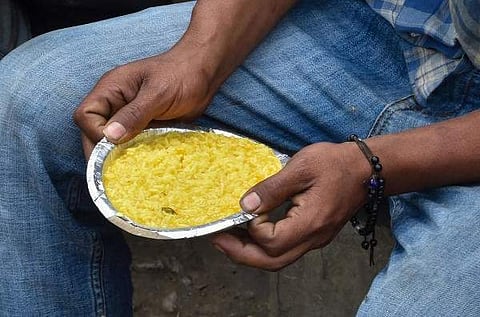

A study by the Centre of Policy Research — A Crisis of Hunger — shows that the lockdown has created an "unprecedented food crisis in Delhi". While those with a monthly income may have a few days of food supply stocked, daily wage labourers who have been rendered jobless have no income and cannot buy food.
The Kejriwal government has announced relief measures for the vulnerable strata of the society but the survey found that "these have serious lacuna that must be identified and addressed to respond to the unfolding crisis of hunger at hand". The government had announced monetary relief for registered workers as well but this fund does not cover non-construction unorganised workers like e-rickshaw, domestic workers and workers employed in small factories and shops, etc. There is no existing mechanism to reach them, the survey report pointed out. "In order to ensure wider reach of these funds, the Chairman of the Board, the Labour Minister of Delhi, will have to expedite the constitution of the board, call an emergency meeting and either waiver or significantly lower registration requirements. If required, Supreme Court and or Parliamentary intervention must be sought to make the required amendments," recommended the report.
Out of the 2,00,000 labourers in Delhi, only 55,000 are registered, said Ashwin Parulkar, a senior researcher at CPR, who worked on the project. "In addition to that, it is an administrative management issue as well, as the boards (dealing with the registration) are defunct. Part of the work is pointing out people who would need relief. A whopping 84 per cent of India's workforce is informal and out of that 15.1 crore people are casual labourers (33 per cent of the workforce). In this emergency situation, identifying sites of vulnerability and mobility is needed to provide the cash compensation but also the food provisioning, shelter and other social protection measures," added Ashwin.
Ashwin and his team spoke to the people on the ground who are facing the problems first-hand and have been told that there is a common pattern almost everywhere — the loss of livelihood led to the search for food, which is increasingly in short supply while cohering government directives on quarantine facilities, disease control and prevention are not underway. "The Delhi government has acted on the need to provide the last mile people with basic necessities in terms of setting up facilities and infrastructure. There were 325 community kitchens last week and now they have 800. The impact of these measures is yet to be assessed," said Ashwin.
Ashwin said that even though it is true that ration shops are open along with community kitchens set up in schools, the problem is the intensity of the demand. The accessibility is not uniform across the UT. Secondly, the population density of some of the areas is so high that people are being missed out. For example, the rickshaw puller who needs this help should first be identified and located so that the relief can reach him," he said. "While the services are there, the coverage is not uniform in North-East Delhi, Seelampur and surrounding areas. Even in shelters where food supply is sufficient, distribution is hampered," he added. At this time, on-demand PDS is strongly recommended, suggested the report. "PDS rations must be given to anyone who walks in. Simple systems like using voter ink to mark those who take rations can minimise double-dipping," it further recommended.
If the relief is not reaching the people they would try to leave and go back home or to their state. "The police is prohibiting vehicles transporting supplies to make their rounds and this might be due to the lack of communication between the government and the Delhi Police. One of the reasons for this information and communication gap is because there are numerous stakeholders involved in the service provision," added Parulkar.
But how worried should we be about this food crisis that presumably can spread beyond Delhi - if it hasn't already? "It is safe to say that it is serious right now. It's not only a socio-economic catastrophe but also a public health catastrophe to begin with, whose extent we are yet to find out. That's what makes it unique in this context. These sections of the society are facing both these calamities at the same time — while we know the hunger problem exists in full force, we do not yet know the spread of the health crisis," he added. "We just saw the Nizamuddin case and that areas have a high population of homeless people and people living in juggis or shanties, most of them migrant labourers from Bihar and UP. The extent to which these people have been exposed has not been ascertained yet. This makes them doubly vulnerable," said Parulkar.
The Delhi government has made bold announcements toward relief in the city but departments are failing to set up clear and speedy mechanisms required to make these measures actually work on the ground, concluded the report. Parulkar added that if the lockdown is extended and the measures promised are not yet in place, the capital along with the rest of the country will see worse days.
